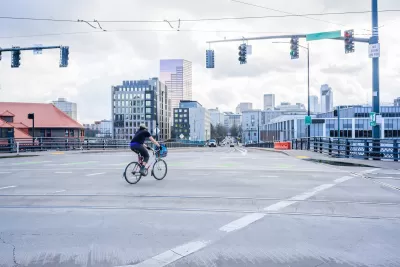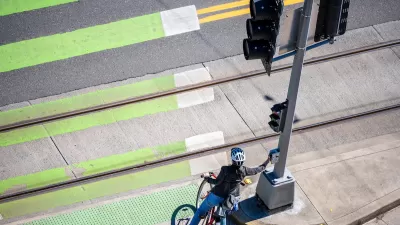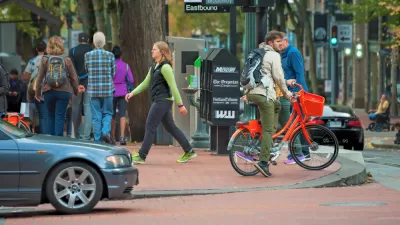Without the extension, the city’s transportation bureau faces a $32 million shortfall.

This month, voters in Portland, Oregon will decide whether to renew a local gas tax that would fund the Portland Bureau of Transportation’s road maintenance budget, reports Alex Zielinski for OPB.
“Voters first approved the 10-cent-per-gallon tax in 2016, to address a mounting road maintenance backlog. It was renewed in 2020. The tax has generated nearly $150 million for PBOT over eight years.” Zielinski explains that the tax funded pedestrian crossing signals, sidewalks, speed bumps, lighting, and other safety improvements on some of Portland’s most dangerous streets.
“If voters agree to extend the tax for four more years, it will generate just over $70 million to address street maintenance and safety projects. It includes $24 million for street paving, $9 million to improve pedestrian safety on busy streets, $6 million for potholes, and $4 million to maintain street lights and signals, among other projects.” Otherwise, PBOT faces a $32 million budget deficit and will likely have to cut down on services.
FULL STORY: Portland gas tax renewal goes to voters in May

Planetizen Federal Action Tracker
A weekly monitor of how Trump’s orders and actions are impacting planners and planning in America.

Restaurant Patios Were a Pandemic Win — Why Were They so Hard to Keep?
Social distancing requirements and changes in travel patterns prompted cities to pilot new uses for street and sidewalk space. Then it got complicated.

Map: Where Senate Republicans Want to Sell Your Public Lands
For public land advocates, the Senate Republicans’ proposal to sell millions of acres of public land in the West is “the biggest fight of their careers.”

Maui's Vacation Rental Debate Turns Ugly
Verbal attacks, misinformation campaigns and fistfights plague a high-stakes debate to convert thousands of vacation rentals into long-term housing.

San Francisco Suspends Traffic Calming Amidst Record Deaths
Citing “a challenging fiscal landscape,” the city will cease the program on the heels of 42 traffic deaths, including 24 pedestrians.

California Homeless Arrests, Citations Spike After Ruling
An investigation reveals that anti-homeless actions increased up to 500% after Grants Pass v. Johnson — even in cities claiming no policy change.
Urban Design for Planners 1: Software Tools
This six-course series explores essential urban design concepts using open source software and equips planners with the tools they need to participate fully in the urban design process.
Planning for Universal Design
Learn the tools for implementing Universal Design in planning regulations.
Heyer Gruel & Associates PA
JM Goldson LLC
Custer County Colorado
City of Camden Redevelopment Agency
City of Astoria
Transportation Research & Education Center (TREC) at Portland State University
Camden Redevelopment Agency
City of Claremont
Municipality of Princeton (NJ)





























